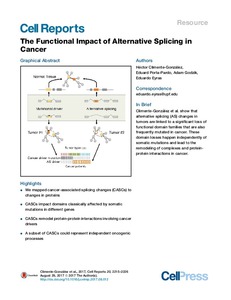Mostra el registre d'ítem simple
The Functional Impact of Alternative Splicing in Cancer
| dc.contributor.author | Climente-Gonzalez, Héctor |
| dc.contributor.author | Porta-Pardo, Eduard |
| dc.contributor.author | Godzik, Adam |
| dc.contributor.author | Eyras, Eduardo |
| dc.contributor.other | Barcelona Supercomputing Center |
| dc.date.accessioned | 2017-09-22T14:27:45Z |
| dc.date.available | 2017-09-22T14:27:45Z |
| dc.date.issued | 2017-08-29 |
| dc.identifier.citation | Climente-Gonzalez, H. [et al.]. The Functional Impact of Alternative Splicing in Cancer. "Cell Reports", 29 Agost 2017, vol. 20, núm. 9, p. 2215-2226. |
| dc.identifier.issn | 2211-1247 |
| dc.identifier.uri | http://hdl.handle.net/2117/107931 |
| dc.description.abstract | Alternative splicing changes are frequently observed in cancer and are starting to be recognized as important signatures for tumor progression and therapy. However, their functional impact and relevance to tumorigenesis remain mostly unknown. We carried out a systematic analysis to characterize the potential functional consequences of alternative splicing changes in thousands of tumor samples. This analysis revealed that a subset of alternative splicing changes affect protein domain families that are frequently mutated in tumors and potentially disrupt protein-protein interactions in cancer-related pathways. Moreover, there was a negative correlation between the number of these alternative splicing changes in a sample and the number of somatic mutations in drivers. We propose that a subset of the alternative splicing changes observed in tumors may represent independent oncogenic processes that could be relevant to explain the functional transformations in cancer, and some of them could potentially be considered alternative splicing drivers (AS drivers). |
| dc.description.sponsorship | H.C.-G. and E.E. were supported by the MINECO and FEDER (BIO2014-52566-R), Consolider RNAREG (CSD2009-00080), AGAUR (SGR2014-1121), the European ITN Network RNP-Net (ID: 289007), and the Sandra Ibarra Foundation for Cancer (FSI2013). E.P.-P. and A.G. were supported by the SBP CC grant (P30 CA030199). All authors thank The Cancer Genome Atlas project for making their data publicly available. The Computational RNA Biology Group is part of the Research Programme on Biomedical Informatics (GRIB), which is a member of ELIXIR-Excelerate of the European Union Horizon 2020 Programme 2014-2020 (No. 676559) and of the Spanish National Bioinformatics Institute (INB), PRB2-ISCIII and is supported by grant PT13/0001/0023 of the PE I+D+I 2013-2016, funded by ISCIII and FEDER. |
| dc.format.extent | 12 p. |
| dc.language.iso | eng |
| dc.publisher | Elsevier (Cell Press) |
| dc.subject | Àrees temàtiques de la UPC::Enginyeria biomèdica |
| dc.subject.lcsh | Cancer--Research |
| dc.subject.lcsh | Splicing |
| dc.subject.other | Cancer |
| dc.subject.other | Alternative Splicing |
| dc.subject.other | Tumor progression |
| dc.title | The Functional Impact of Alternative Splicing in Cancer |
| dc.type | Article |
| dc.subject.lemac | Càncer--Tractament alternatiu |
| dc.subject.lemac | Càncer--Investigació |
| dc.identifier.doi | 10.1016/j.celrep.2017.08.012 |
| dc.description.peerreviewed | Peer Reviewed |
| dc.relation.publisherversion | http://www.cell.com/cell-reports/fulltext/S2211-1247(17)31104-X |
| dc.rights.access | Open Access |
| dc.description.version | Postprint (published version) |
| dc.relation.projectid | info:eu-repo/grantAgreement/MINECO//BIO2014-52566-R/ES/CARACTERIZACION Y DETECCION DE ALTERACIONES EN EL PROCESAMIENTO DEL RNA CON RELEVANCIA CLINICA PARA LA MEDICINA PERSONALIZADA DEL CANCER/ |
| dc.relation.projectid | info:eu-repo/grantAgreement/EC/H2020/676559/EU/ELIXIR-EXCELERATE: Fast-track ELIXIR implementation and drive early user exploitation across the life-sciences./ELIXIR-EXCELERATE |
| dc.relation.projectid | info:eu-repo/grantAgreement/EC/FP7/289007/EU/"RNPnet"/RNPNET |
| local.citation.publicationName | Cell Reports |
| local.citation.volume | 20 |
| local.citation.number | 9 |
| local.citation.startingPage | 2215 |
| local.citation.endingPage | 2226 |
Fitxers d'aquest items
Aquest ítem apareix a les col·leccions següents
-
Articles de revista [374]


